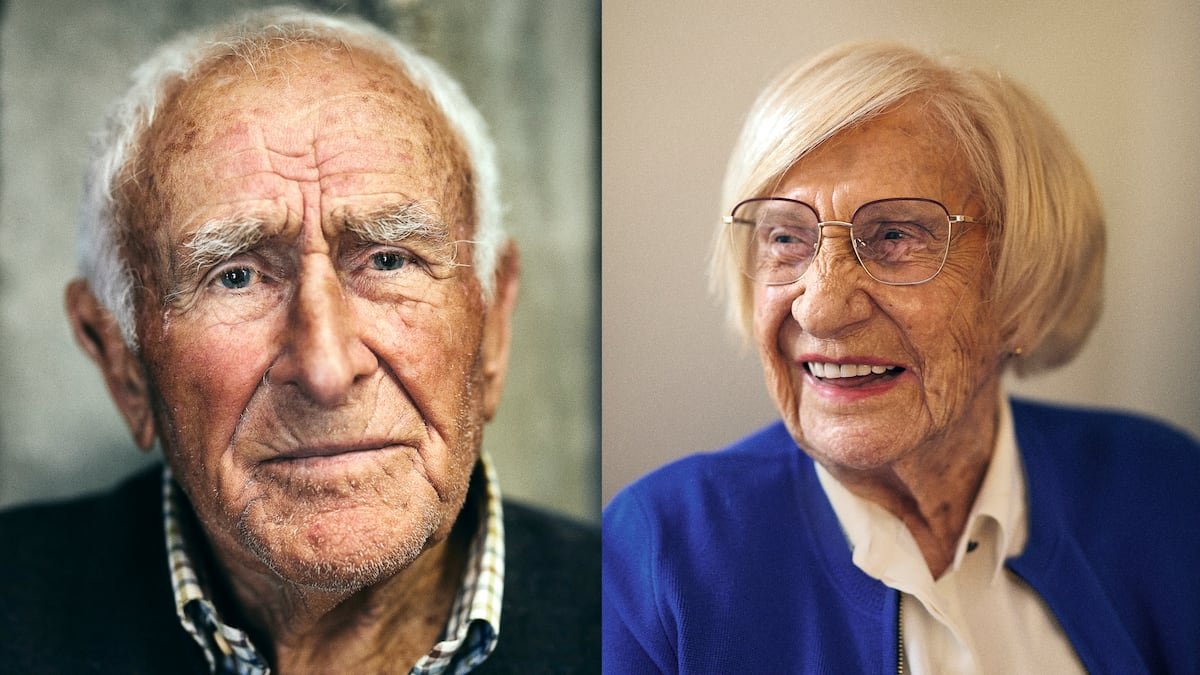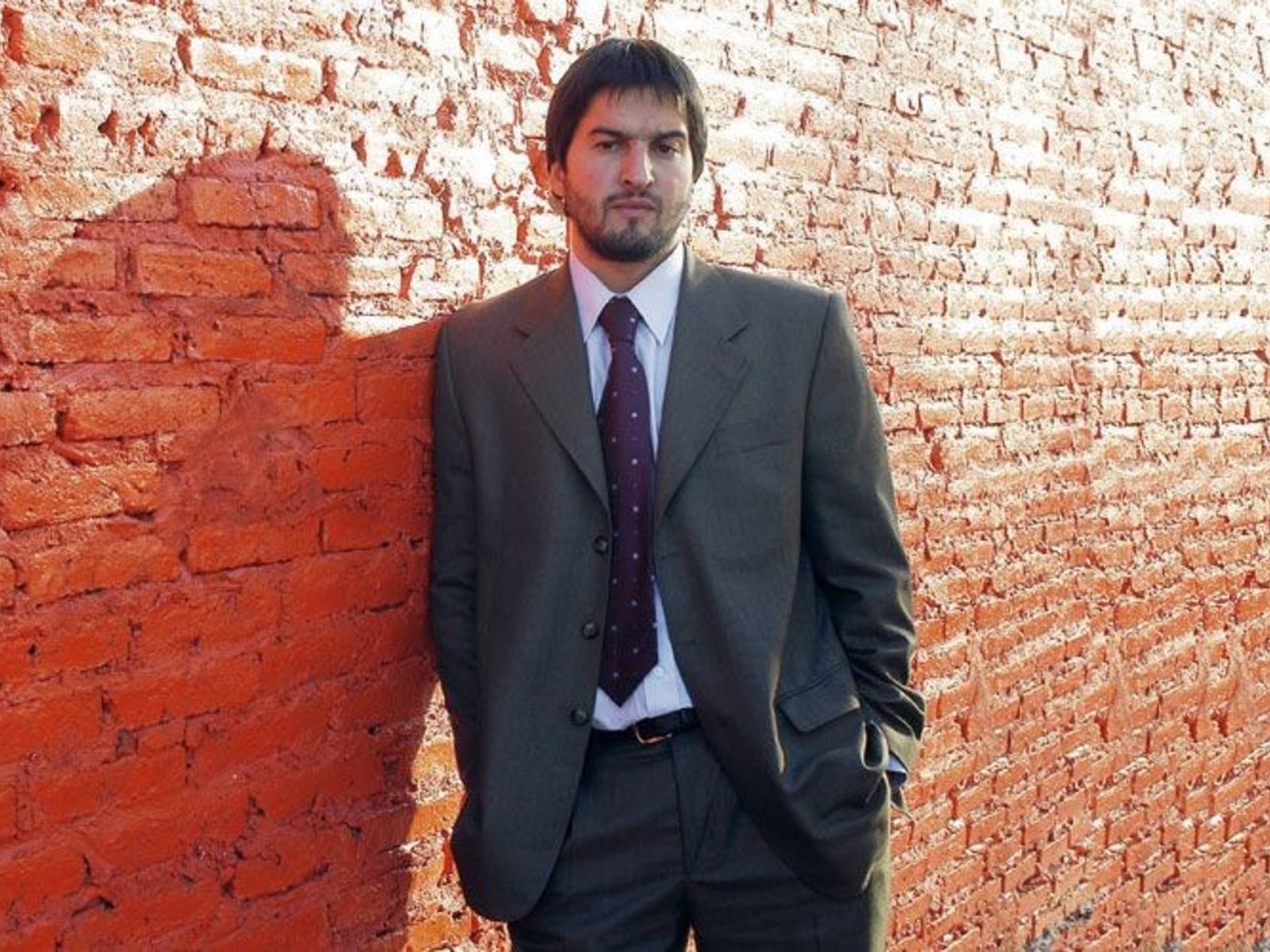Spain is a country of longstanding treasures. This is proven by the epic stories of men and women who, with stamina and courage, have lived more than a century. They all demonstrate that they know how to survive… but, above all, that they know how to live. And they do so without a sense of resignation, without conforming to whatever is expected of them.
Over more than 100 years, they have given their all, whether it be caring for loved ones, or working until they lose their sense of purpose. They have emigrated, only to return with something better; they’ve enjoyed themselves while overcoming blows and losses. They have seen others leave, while surrounding themselves with the right people. They have eaten well, but they have also, at times, endured hunger. These witty Spanish centenarians have maintained an unwavering faith, building families that are filled with the warmth of children, grandchildren and great-grandchildren. These offspring, in turn, listen to their elders’ memories and care for them in a noble and natural cycle of life.
Spain is the country with the second-highest life expectancy in the world, behind only Japan. Among those who have crossed the 100-year mark – according to the 2024 data from the National Statistics Institute (INE) – there are 16,902 (13,919 women and 2,983 men) centenarians in the country, or 76% more than in the last decade. And this figure could reach 230,000 within 50 years.
Maintaining this momentum represents a challenge. But, above all – according to Juan Martín, director of the International Center on Aging (CENIE), affiliated with the University of Salamanca – it represents “an opportunity.” He presents the incontestable figures of this evolution: in 1900, life expectancy in Spain was 34 years. In 2025, it will reach 84. Half-a-century ago, in 1975, 650,000 babies were born. In 2024, the total was 322,034. We’re witnessing an escalation in longevity (a term that Martín prefers to use, rather than “aging”).
Spain is also a country where many people who were born abroad choose to spend their later years. “Therefore, we should – far from [seeing this as] a problem – consider it to be a strategic asset,” Martín adds. To achieve this, it’s essential to preserve the best health and cognitive abilities in those who overcome the greatest life barriers. “We must rethink everything with a view to achieving this,” he asserts. This affects the entire societal structure, from the healthcare system itself, to reinforcements in preventive care and economic structures. “We must, therefore, sign a new social contract and anticipate [problems, while remedying them] with solutions.”
Mónica de la Fuente, a professor emeritus of physiology at the Complutense University of Madrid, says that the ability to live a long and healthy life depends “on the capacity to adapt.” Beyond biological, genetic, dietary or environmental factors, she maintains that it’s essential to “keep the nervous, endocrine and immune systems in check.” Those who have led easy and comfortable lives do not necessarily live longer. On the contrary, “those who have demonstrated greater resilience in difficult situations do so,” De la Fuente emphasizes. Even those with optimal genes aren’t guaranteed longevity: “That [factor] influences 25%… [but] the remaining percentage depends on lifestyle and motivation.”
This is something that EL PAÍS encountered on a visit to Spain’s northwestern region of Galicia. A higher prevalence of centenarians has been detected here compared to other regions of Spain. This is especially the case in the province of Ourense, as well as in parts of the provinces of Lugo and Pontevedra. A total of 34 municipalities in that area are currently eligible for “Blue Zone” status. This select club currently includes five regions from around the world where the greatest longevity has been detected.
Michel Poulain, a professor emeritus at the University of Leuven, in Belgium, is one of those responsible for certifying these areas worldwide. They are characterized, the scientist points out, “by an exceptionally high concentration of centenarians in good health,” which is determined via research investigations. So far, Sardinia (Italy), Okinawa (Japan), Ikaria (Greece), Nicoya (Costa Rica) and, recently, the island of Martinique have been recognized. Galicia could soon join that list, Poulain assures EL PAÍS.
And that’s what José María Faílde, president of the Galician Society of Gerontology and Geriatrics, is working on. He’s immersed in studies and tests that will convince Poulain’s team. To do so, he and his colleagues must unravel the intricacies and delve into data provided by the INE, so as to identify municipalities where numerous residents surpass the 100-year barrier. But there’s one factor that’s more conclusive than in other places: “What’s surprising in Spain isn’t just the number of centenarians, but also their quality of life and the abilities they retain.” Faílde notes that those who best manage to avoid the defining factors of the modern vortex – technology, a sedentary lifestyle, a poor diet, a lack of a sense of [spiritual] transcendence, and loneliness – are the most successful.
At 102 years old, Moni Gamecho Azpeitia is still an elegant racket player. One day, Moni’s children noticed their mother challenging her friends to a game of Basque pelota (a sport from the racquetball family) and beating them. Nobody could defeat her. Later – when she was approaching the age of 80 – she told them a secret. In her youth, she had earned her living playing the sport, traveling around Spain and winning tournaments. But she didn’t tell them because Jaume, their father, didn’t want them to find out. At the time it wasn’t well-regarded for someone to make a living in a field that involved sports betting.
“Do you mind if I go out onto the terrace for a cigarette?”
Her daughter – who accompanies Moni at her home in Barcelona – isn’t the one who asks for this. It’s her mother, who allows herself three or four cigarettes a day at the age of 102. “It’s so pleasurable!” She’s been smoking since she was 13 years old. “I’ve never quit. And white wine: I can’t go without it. You can’t eat codfish with water, give me a break!”
When Moni takes stock of her life, almost all of it has been bright. She has four children, seven grandchildren and 13 great-grandchildren. She also had a good childhood in the Basque town of Pasajes de San Juan, where they lived off her father’s fishing boat, then a years-long career as a professional athlete, as well as a happy marriage to Jaume. “He was very handsome, a hard worker and a good businessman,” she recalls. Moni got married after surviving the Spanish Civil War: supporters of the Basque Nationalist Party, she and her family had to flee their home. “[We were] totally anti-Franco,” she emphasizes. First, they settled in the municipality of Portugalete. Then, they moved to France, followed by Valencia. She ultimately ended up in Barcelona, with season tickets to the the opera at the Gran Teatre del Liceu and crazy nights of dancing until the wee hours along the Paral·lel avenue, all while summering an hour away at the beach in Lloret de Mar. And she never stopped making the drive to Pasajes de San Juan (always hitting the gas, given her love of speed).
Her secret to longevity? High morale, as she demonstrates while looking through her photo album: “I was very elegant and very beautiful. I had great hair… I’m a great dancer. Look at those dresses, look at those furs, look at that agility… [I] attracted attention wherever I went.”
Another centenarian, 104-year-old Flori Almaraz, fell in love between prison visits. Republican Lieutenant-Colonel Domingo Morriones – the father of Luis, her deceased husband – was being held in Córdoba Prison. He was serving his sentence alongside Lorenzo Almaraz, Flori’s father. She also used to visit her dad. And that’s where she and Luis met.
Their fathers suffered different fates. Morriones was spared. Almaraz was shot. From then on, Flori Almaraz Garrote and her siblings had to fend for themselves. Her relationship with Luis continued through letters, he in Andalusia and she back in Zamora, the province where she was born, in the town of Luelmo de Sayago, back in 1920. But what didn’t subside was her rebelliousness and loyalty to her people. She was even sentenced to prison for collaborating with her friends who were hiding in the mountains while working against the Franco regime. “I wasn’t politically active in anything, but friends are friends. So, I helped them.” She worked in a soap factory and a warehouse, where she could easily acquire supplies. She was caught and served time in Valladolid Penitentiary Center.
Flori later married Luis and started a family with three daughters. They first settled in Valencia and then in Santander. There, she welcomed EL PAÍS, insisting that she be addressed by her given name. “I’m too old to be addressed formally,” she chuckles. Her daughter, Begoña, a family doctor, accompanies her. They both remember how they moved north so that Hortensia, Begoña’s sister, could study Civil Engineering. Luis then got a position as a municipal employee, so they stayed. “I’m fine anywhere,” Flori shrugs. Especially with her three daughters, two grandchildren, four great-grandchildren… and several books. “I read every day,” she declares. She also learns about the world through the press and television: “Sometimes, I don’t understand this country. I don’t like people yelling at each other. Everyone has the right to food, to good health and to be able to study. This [concept] – which is very simple – sometimes seems very difficult.”
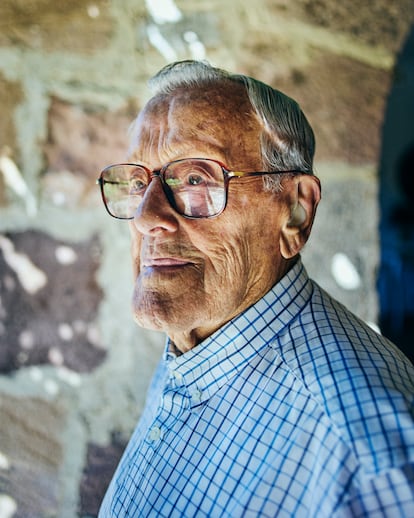
Domingo Payno Sáez is a singer. At 104 years old, he stills sings mountain folks songs, just as he did as a young man with his friends on Saturdays, in between flirting and enjoying a snack or two. He remembers those days as he sits on the porch of his children’s house in Bárcena de Pie de Concha, a municipality in the small northern region of Cantabria. Not far from there, in Santa Cruz de Iguña, he was born – more than a century ago – to a family of grocers. His father had learned the trade down in Andalusia, where he became what in Cantabria they call jándalos: migrants from the south to the north. This gave the family character, a survival instinct, as well as a particular way of understanding life.
Domingo, on the other hand, didn’t emigrate. As a child, he spent time with the kids from his village, either at school, playing games in the street, or devoting time to reciting the rosary. “I pray every day,” he says. And, until recently, he attended mass every day.
Both of his childhood hobbies stuck with him. And so did soccer. Today, he’s a member of Torina – the town’s team – which brings him almost more joy than the much larger Racing de Santander. To this day, Domingo can’t remember a better lineup than the one that led the team to a runner-up finish in La Liga of 1931: “Sola, Ceballos, Mendara, Ibarra, Baragaño, García, Santi, Loredo, Larriñaga, Telete, Cisco…”
At 16, he joined a metalworking company in Los Corrales de Buelna. There, he retired as a workshop manager and soon moved with his wife, Sita, to Santander. “My life has been my wife and work.” When she died, his nephew, José Manuel (who’s more like his son, because he calls him “dad”), took him to Madrid, where he did nothing but enjoy life: “I had more than just a good time,” he jokes. With COVID, however, they headed back to Bárcena. The whole family caught the virus except for him.
In his new home, he has continued singing, becoming an encyclopedia of folklore repertoires for the young people.
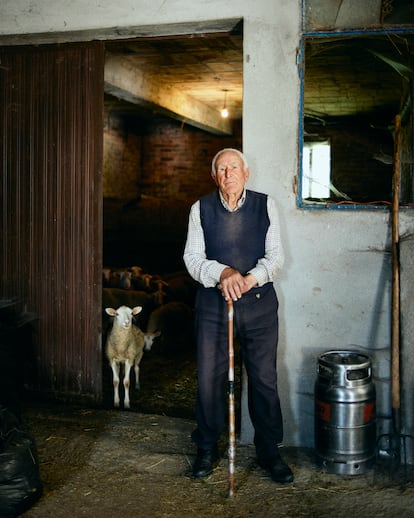
When EL PAÍS arrived in the Galician municipality of Beade at 10 A.M., 104-year-old Eustaquio Pérez wasn’t home. Orita, his wife – a 93-year-old woman who has rarely ventured away from the village – told us he’d gone out with the sheep, just like he does every morning. However, after searching the surrounding area, there was no sign of him. The cobblestone paths were bogged down in their fair share of mud, enough to cause a nasty fall for anyone (especially if you’re 104). His grandson, Pablo, along with Chema Faílde – the man who preserves the memory of the elderly residents in the province of Ourense – spoke about him. The legend grew, as if he were a Captain Kurtz from Conrad’s Heart of Darkness (1899).
Earlier in the morning, at 5 A.M., his grandson had checked in on Eustaquio, confirming that he was ok. He had recorded him on his cell phone, having breakfast alone in the kitchen. He ate his migas – fried breadcrumbs – and coffee with milk, along with four tablespoons of sugar. That’s right, four. Then, he took the sheep off to graze until noon. Afterwards, his grandson explained, he would come home to eat and lie down for a bit, while watching TV.
Orita passed the time by telling EL PAÍS how her husband – whom she met at a village dance – had emigrated to Equatorial Guinea. His parents, Clodomiro and Manuela, had left earlier, for Argentina, but their son had opted to stay in the region. Between Europe and Africa, he made a living as a domestic worker. Then, he got into smuggling.
Around noon, Eustaquio finally appeared. He sat down to confirm everything. “Here we are, resisting. Knowing how old I am, that’s all I have left: resisting. Year after year, I resist. No [long-term] plans: just eating, drinking and sleeping, that’s all there is. Lots of rest…”
He also thoroughly justifies the reason for his early mornings: “I enjoy my time working. Sleeping, not so much.”
“When I was a child,” he adds, “we had a very difficult life.” And what about his smuggling career? “Here, we have the border with Portugal, where we maintained that way of life. There was always business; [I started out] with coffee, working on my own. I was a smuggler by tradition.”
Emigration to what was then known as the province of Fernando Poo (modern-day Bioko, in Equatorial Guinea, a former Spanish colony) also left its mark on him. He worked in construction for 12 years. Then, he had to leave the country, when President Teodoro Obiang came to power. But with the money he saved, he was able to return to his homeland and buy some acres. “Work is my joy. Ain’t nothing better.”
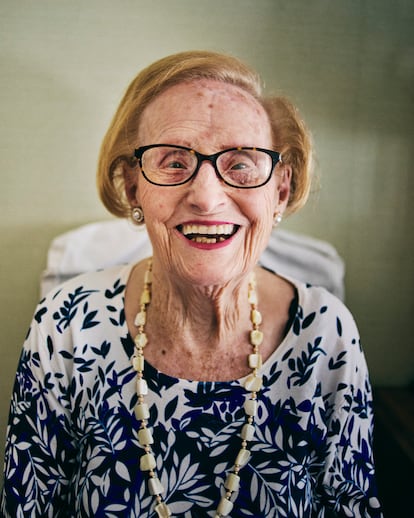
Esperanza Cortiñas, 108 years old, was born in the Galician city of Lugo and she is a great dancer. At her age, she still doesn’t like to miss an opportunity to dance. Although lately, she’s been afraid of losing her balance… something she tempers with a medication for vertigo. Even so, she persists with her pasodobles and tangos on Sundays when she performs at the Ourense Social and Community Center. She lives in the city with her daughter, Mari Carmen. “Well,” she clarifies, “it’s my daughter who lives with me.”
Born into a family of four siblings, she’s the daughter of Avelino and Serafina, who had to emigrate from Spain to Cuba. It’s the same thing she would do years later, but to Paris. She had been widowed by Manuel, her husband, who didn’t have an easy life, either. All his brothers were killed in the Spanish Civil War. And he never recovered from silicosis, a lung disease that affected him after working tirelessly on the construction of a major dam in Galicia. A meager pension wasn’t enough to live on, so Esperanza went to France, where she worked tirelessly. “I almost went half-crazy,” she sighs. “But it was worth it. With my savings, I bought the house I have now, next to the bridge.”
She left Spain on her own. And then she brought over her daughters: Mari Carmen, Esperanza and Aurora. The latter two now live in Xàtiva (Valencia) and Paris, respectively. And today, the daughters enjoy what they couldn’t for years: the company of their mother, through dancing, her fondness for sweets and the shots of coffee liqueur they make at home.
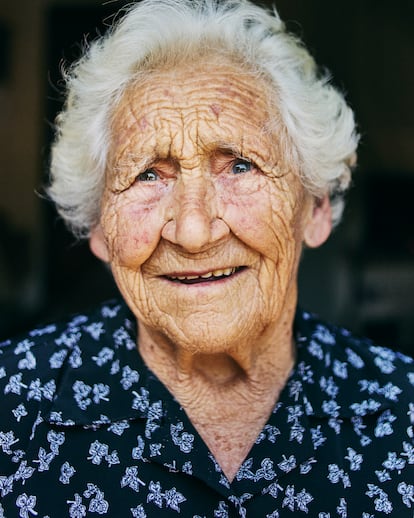
Felisa González, 101, does daily exercises in her garden. “Come to my gym,” she smiles. She leaves the kitchen of her home in O Irixo, in the Galician province of Ourense – where she still uses a charcoal stove to heat food – and turns the corner, showing EL PAÍS her garden. There, she grows potatoes, tomatoes, beans, cabbage and legumes.
Unlike many of her neighbors in the region, she didn’t emigrate and stayed home instead, working part-time as a caretaker for the elderly and the children left behind by those who went off in search of opportunities elsewhere. Caring for others has been her vocation and her livelihood. And Felisa looked after the vulnerable for more than just money: she was often rewarded with food and furniture, in a bartering system. She made ends meet with the sale of eggs, or with whatever she grew in her garden.
Chickens roam around the semi-abandoned village where she lives today: there’s only one neighboring house. If she wants to see some hustle and bustle, she visits other towns. From time to time, she’s surprised with a celebration: the residents threw one for her 100th birthday, when the Town Hall presented her with a medal. “I cried with emotion,” she recalls. That day, she surely remembered her parents, her four siblings, her husband – Antonio Nogueira, who fought in the Battle of the Ebro (the longest and bloodiest battle of the Spanish Civil War) – and her son, José Antonio, a police officer who died at the age of 74. Her two grandchildren and three great-grandchildren were at the ceremony, witnesses to the strength of a woman who doesn’t know the meaning of the word “surrender.”
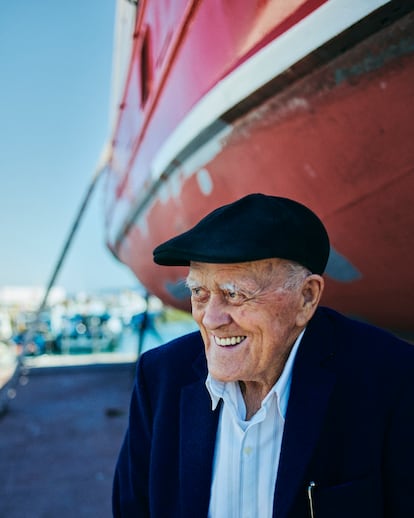
Manuel González Rúa, 100, spent his life at sea. “My life has been a bit of everything,” he reflects, sitting in his home. He lives in the Port of Bueu, in the province of Pontevedra. But there’s one thing that his life has been centered around, more than anything else: the sea. Growing up along the coastal region of Rías Baixas – surrounded by mist-covered hills, idyllic beaches and rafts that drift on the fury of the water – was an invitation to explore. Manuel did so, but without straying too far: “I was never into deep-sea fishing.”
He confesses that he was a happy child, up until his father died when he was 14. “Then, the hardships began.” They had two boats at home. But when the war came, they could only use one. There weren’t enough working-age men to do everything: “There were only old people and children left.”
After the war, the able-bodied men resumed their work. Manuel earned just half of the standard salary, because he was told that he didn’t have the strength to move the gear. When he finally proved his worth, the men gave him his full pay. Little by little, he not only began to earn a fair amount of money, but also respect. He soon learned that the sea needed “young people and strong [cargo haulers].”
Manuel maintained his creativity in his workshop, where he entertained himself by designing and building boats. At the age of 24 he married Mercedes, a neighbor who had known him since childhood. They had two daughters together.
Even back then, he knew that inshore fishing was his calling: deep-sea fishing meant too much time away from his family, as well as wounds on his hands, caused from tugging the wires. He eventually began embarking on merchant ships, serving as chief engineer. Later, he acquired a ship that changed his fortunes: La rosa de los vientos (“the compass rose”). It made him so much profit that he opened a bar. Thus, the family prospered: today, its members make a living from distributing fish and seafood throughout Spain.
Manuel enjoys spending time with his six grandchildren and eight great-grandchildren just as much as they enjoy seeing him. On July 16 – during the Feast of Our Lady of Mount Carmel, the main festival in Bueu – they gathered around a table laden with spider crabs, prawns, crayfish…
A friend was right when he advised him: “With bottom nets, you’ll always eat.”

At 102 years old, Josefa Villanueva is the best cook in the Marín area. She points out that, in fact, she’s 102 years old “and-a-half.”
Josefa Villanueva knows that priests eat better than soldiers. She’s cooked for both branches: at a spiritual retreat house and at the Naval Academy in Marín (Pontevedra), where she ran the kitchen for the high command. And she’s a woman who knows how to measure the excesses of her language: she’s careful to curb her euphoria, but she doesn’t hide the joy of having spent a century with her family. Listening to her quick wit is a pleasure. She tells EL PAÍS that, growing up, she was one of five siblings, raised by Enrique and Josefa, their mother. Her childhood wasn’t one for extravagance. “[It was] sometimes good, sometimes bad,” she shrugs. She remembers this today when she goes to one of those supermarkets she loves: “There’s everything: even if you can’t buy anything, you go in naked and come out dressed.”
She was a smart girl, even though she had to drop out of school. She married young – to Pedro Bermúdez – and they had a daughter. She soon understood the meaning of Rosalía de Castro’s poem, The Widows of the Living and the Widows of the Dead. The former were those who stayed in Galicia while their husbands emigrated. Pedro left them when their daughter was seven and never returned. He wandered around Brazil and then Uruguay. That’s where he died.
There were other suitors: “I wasn’t going to be like a donkey, tied to a post.” Together, with her daughter (also named Josefa), she explains that, “at times, things improved.” She learned by understanding the human condition: “In this world, you have to be good sometimes and bad sometimes; otherwise, the flies eat us.” She worked and worked. She made sure there was always food on the table: “If you can eat something good, you don’t eat something bad.” There also must always be bread on the table, to chase away memories of the Civil War. “One day, I saw a loaf of bread [and couldn’t afford to buy it].” She learned to make empanadas herself. Her corn empanadas are unrivaled in the Marín area.
Josefa likes to give orders: “But if I had money, I’d be better at giving orders,” she points out. Through this article, she asks that the authorities increase her pension. “They might read this if it’s published… but I don’t know if they’ll understand.”
Another Spanish centenarian, José Escobar, wasn’t able to read this report. But he told us about his life in his Cordoba home, alongside his son, José Manuel. While the 106-year-old sat at his table, his son handed us his trophies. Many were won thanks to a battle of longevity and survival. Before leaving, we saw two papal blessings on parchment: one from John Paul II – a gift for his silver wedding anniversary with his wife, Concepción – and another from Pope Francis, on his 100th birthday.
Escobar received several awards throughout his life. And he always had the image of the Virgin Mary close by. He endured his time on Earth, raised two children and enjoyed two grandchildren and three great-grandchildren. He thanked the Virgin for his work at a local grocery store, which he joined in the 1930s. He prayed to her first with his mother and then with his wife, whom he met at a potluck in the city. Devotion and work made up his legacy, along with some diversions (such as soccer and his support for Córdoba FC). He was reliable, methodical, fervent and discreet. He sowed goodness and lived a healthy life, with few mishaps: “Small ulcers and the occasional hernia, no more.” Escobar made only a few visits to the hospital. And, if he ever had to spend the night there, he wouldn’t enter his room without his image of Our Lady of Sorrows.
Sign up for our weekly newsletter to get more English-language news coverage from EL PAÍS USA Edition





